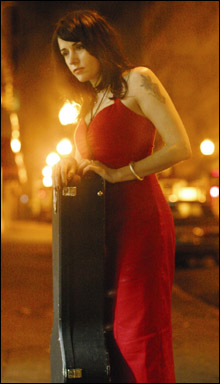 Just about a year ago, singer-songwriter Eileen Rose was playing a gig at South by Southwest in Austin. It was meant to be her big showcase, with a handful of record labels in the house. What she didn’t realize was that the club faced directly out to the Sixth Street party district, and that her back was to the open windows. So she wound up playing the piano ballad “Ocean of Fire” — a song of love and catharsis — while listening to a couple of drunk fratboys comparing notes on the shape of her butt.
Just about a year ago, singer-songwriter Eileen Rose was playing a gig at South by Southwest in Austin. It was meant to be her big showcase, with a handful of record labels in the house. What she didn’t realize was that the club faced directly out to the Sixth Street party district, and that her back was to the open windows. So she wound up playing the piano ballad “Ocean of Fire” — a song of love and catharsis — while listening to a couple of drunk fratboys comparing notes on the shape of her butt.
But that show did lead to a European record deal, so it was a case of winning over adversity. And that, give or take the fratboys, is what Come the Storm is all about. So far an import on the CBS-associated Banana label, the album should be out here by midsummer. It’s the knockout Rose has been building up to since her mid-’90s days with the pop-rock band Fledgling (briefly signed to TVT) and through a UK-based solo career. With its theme of hitting the depths and coming out stronger, this is no timid singer-songwriter disc: a gorgeous undertow runs through the 10 songs as she and her studio band (formed around her husband, ace guitarist Seth Goodman) do a bit of country rock, a bit of twisted rockabilly, and a lot of deep blue chamber pop. Come the Storm has its straight-ahead pop moments, like the Pretenders-styled opener “Last New Year’s Eve,” but it’s the more haunting and abstract numbers that really linger.
“Yeah, it’s kind of miserable,” she says when we meet in Harvard Square. “You know, I thought people would hear it and say, ‘Great, call us back when you’re feeling better.’ But I’ve certainly dabbled in misery in the past. And when you consider what’s been happening in the country right now, how can anyone write a record about booze, boys, and Saturday nights?
“But there’s some pop songs in there too, even if it’s strange eclectic pop. My label said it was Neko Case in bed with Tom Waits and Neil Young.” This with a quizzical look. “But I’m not sure about that. I always thought I was more like . . . like Patti Smith in bed with Desi Arnaz.”
The songs were Rose’s way of processing what her life’s been like since family matters drew her back to Boston three years ago. Her British career had made her a cult figure of note, and she still fills theaters when she tours Europe. (She returned from an Italian tour last week). Coming home meant going back to playing empty clubs on weeknights. “Coming back to Boston turned out to be just as traumatic as leaving had been — it was a pretty lonely three years. You think you’re coming home to this big, warm embrace, and sometimes it doesn’t turn out that way.” And after living quietly in the English countryside, returning to the US in the wake of September 11 was a rude awakening of a different kind. Although she chose the album’s title before Katrina, it wound up being prophetic. “If the record sounds kind of haunted, it was partly me being creeped out by first seeing that inspiring patriotism that happened right after 9/11 and then seeing it take a more ugly turn — seeing effigies on people’s lawns, and the guns pointed toward Iraq. I may not be equipped to argue these things politically, but as a songwriter I have to absorb them and spit them out.”